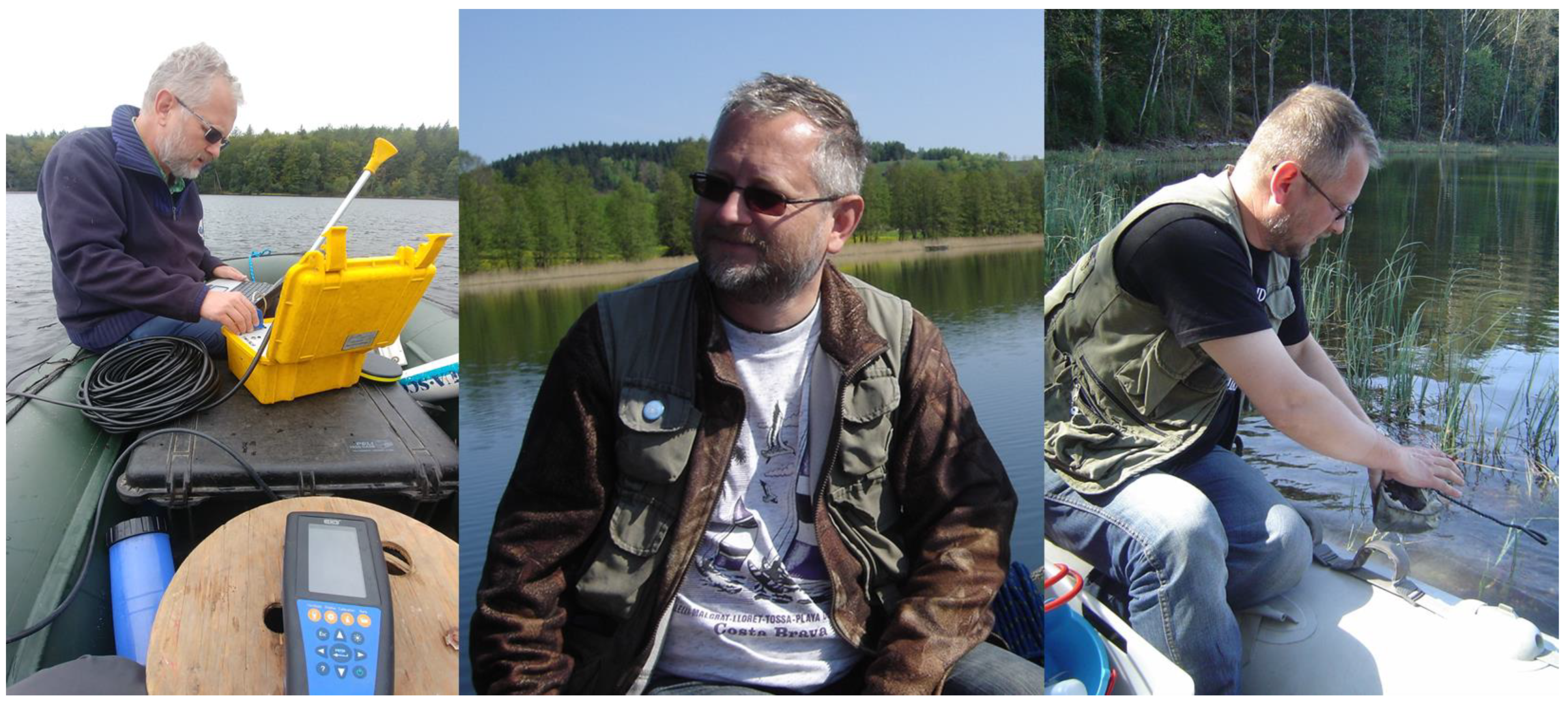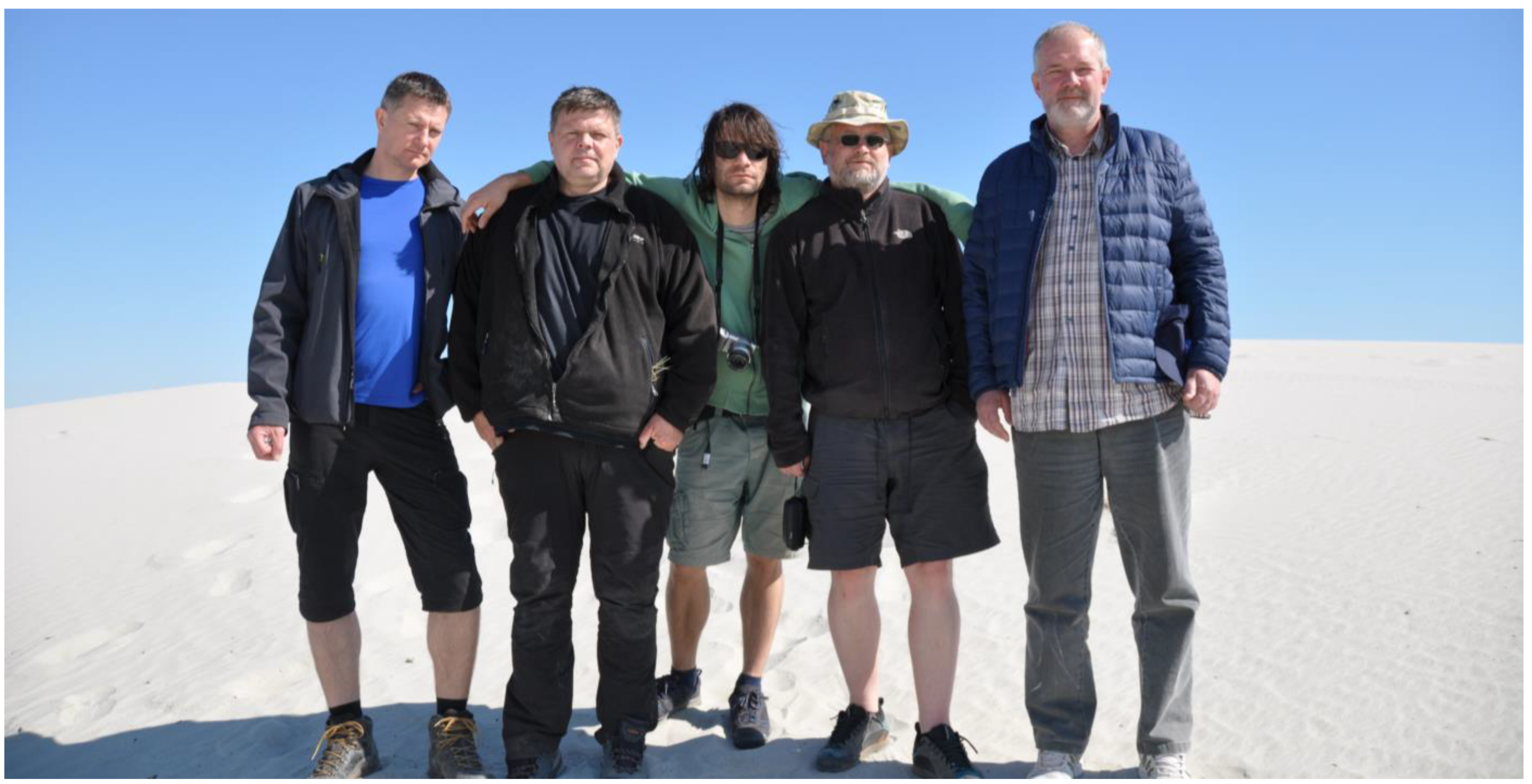Dariusz Borowiak, a respected Polish limnologist and geographist, died on 7th November 2022, at the age of 60, in Gdańsk, the city where the ideas of Polish companionship and solidarity were born. As a scholar and as a friend, he was always faithful to them. On 17th November 2023, his family, colleagues, and academics gathered at the memorial service to pay their respect to Prof. Borowiak while remaining stunned by his loss.
Born in 1962, he was raised during the difficult times of communism in Poland, immersed in economic hardships and social unrest. However, at the same time, he lived in Pisz, a small picturesque town in northeastern Poland, a part of the Masurian Lake District, an area of impressive natural beauty with more than 2000 lakes, dense forests, and high biodiversity. Such an environment shaped Dariusz’s lifelong interests and desires, focusing them on geography and aquatic ecosystems. In 1988, he graduated from the Faculty of Biology, Geography and Oceanology of the Gdansk University in Poland, defending his master’s thesis on the analysis of the surface drainage system of the river network of the Republic of Panama. A year later, he began an academic work at his Alma Mater, his second home and a pathway to explore the world and encourage others to follow him.
For Prof. Borowiak, cooperation was always above competition. He was calm, forgiving, understanding, devoid of envy and jealousy, always willing to help and create. In 1993, working with Prof. Władysław Lange, he co-founded the Department of Limnology at the University of Gdańsk. In 2001, he was one of the founders of the Polish Limnological Society, serving for many years as a member of its board. In 2013 he was elected Editor-in-Chief of Limnological Review, a journal to which he was always very attached. When needed, Dariusz was a one-man band, not only handling the submitted manuscript and inviting the reviewers but also proof-checking, typesetting, and copyediting the accepted articles. In 2012, he became the head of the Limnological Station, located at the Radunskie Lake in the Kashubian Lake District in the northern part of Poland. Since 2016 he has been heading the Department of Limnology. His staff valued him as a boss who respected others and put the human side of employees at the center of attention.
His scientific interests always circled around the lakes (
Figure 1). He pursued studies on the circulation and transformation of matter in the early post-glacial riverine-lake systems, optical properties and thermal structure of lake waters, and human-driven transformations of aquatic ecosystems. In 1998 he conducted a successful deference of his Ph.D. thesis entitled “
The water regime of the Polish Lowlands Lakes as a basis for evaluation of their hydrological function”.
In 2011 he received a habilitation, a post-doctoral degree in Poland, based on the monograph titled “Optical properties of Pomeranian lake waters”. It concerned local, regional, and global spatial factors as the main reasons for differences in the optical properties of lakes, affecting optically active water constituents in qualitative and quantitative terms.
An important branch of Prof. Borowiak’s research has been the study of lobelia lakes, rare softwater bodies with unique isoetid flora (Lobelia dortmanna L., Isoetes lacustris L., and Littorella uniflora (L.) Ascherson), low nutrient concentration indicating oligo-mesotrophic state, and high water transparency. He has also made significant contributions to protecting these ecosystems and habitats within the framework of national conservation programs and the Natura 2000, the largest coordinated network of protected areas in the world, which stretches across all 27 European Union countries. Works by Prof. Borowiak were published in renowned peer-reviewed journals, e.g., Environmental Science and Pollution Research, Chemosphere, and Water. In addition, he authored various books and chapters on the functioning of the lakes, and attended numerous national and international conferences on limnology. He was also a member of the International Association of Hydrological Sciences (IAHS), and the Association for the Sciences of Limnology and Oceanography (ASLO).
Students of the Faculty of Oceanography and Geography at the University of Gdansk remember Dariusz Borowiak as an exceptional lecturer and gentleman. Despite increasing obligations, he had enormous patience and understanding for young people, whose teaching was one of his many life-long passions. Therefore, in 2013–2016 he served as Dean of Student Affairs. During his career, Prof. Borowiak promoted dozens of master’s and bachelor’s degree theses, frequently based on in-field studies.
Dariusz Borowiak was a man of passion. His love for nature translated into the constant trips to work in the field, at the lakes, and within the forest. His wish to see different places in the world was accompanied by relentless planning, swiftly moving from words to deeds. Driven by curiosity, he traveled to distant and remote places. In 2006, he went on an expedition to Baikal Lake, and in 2018—to the Aral Sea (
Figure 2).
Mountains had a special place in his heart. In 2004, he conquered Aconcagua (6961 m a.s.l.), the highest mountain in the Southern Hemisphere. Throughout the years, he summited Himalayan’s Gokyo Ri (5357 m a.s.l.), Kala Pattar (5644 m a.s.l.), and Mount Ararat (5137 m a.s.l.). He challenged himself to climb the highest peaks of each European country (
Figure 3) and would have succeeded if only his health had allowed it. Dariusz even had further plans—after conquering the Crown of Europe, he planned to swim in the deepest lake of each country. After all, limnology was not only his professional interest but also a hobby.
In the last chapter of his life, Dariusz fought an uneven battle with severe disease. This difficult, highly challenging period did not diminish his limnological interest. In mid-September 2022, he attended the “Natural and Anthropogenic Transformations of Lakes and Water Bodies” conference, organized to honor 20 years of the Polish Limnological Society. When another academic year began in October 2022, there was Dariusz, who, despite worsening health, was giving lectures to his students. “There is no point in thinking about what once was possible but is no more. One should only focus on what still remains possible and do best, step-by-step, to achieve it”—these truly inspirational words, spoken by Dariusz at the end of his journey, were the prime example of the unique manner in which he confronted hurdles throughout his life.
He is survived by his wife, Magda, mother, Zefiryna, and many others who have been inspired by his work and life.
Dariusz, we will miss you.









